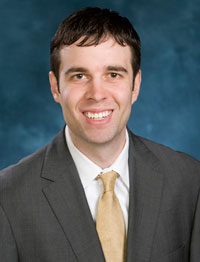 The Air Force Office of Scientific Research (AFOSR) announced at the end of 2010 the results of an award of ~$16.5 million in grants to 43 scientists and engineers who submitted winning research proposals through the Air Force’s Young Investigator Research Program (YIP). ME Assistant Professor John Hart was one of the recipients of the 2010 AFOSR YIP award. YIP is open to scientists and engineers at research institutions across the United States who received PhD or equivalent degrees in the last five years and show exceptional ability and promise for conducting basic research. The object is to foster creative basic research, enhance early career development of outstanding young investigators, and increase opportunities for the young investigator to recognize the Air Force mission and related challenges.
The Air Force Office of Scientific Research (AFOSR) announced at the end of 2010 the results of an award of ~$16.5 million in grants to 43 scientists and engineers who submitted winning research proposals through the Air Force’s Young Investigator Research Program (YIP). ME Assistant Professor John Hart was one of the recipients of the 2010 AFOSR YIP award. YIP is open to scientists and engineers at research institutions across the United States who received PhD or equivalent degrees in the last five years and show exceptional ability and promise for conducting basic research. The object is to foster creative basic research, enhance early career development of outstanding young investigators, and increase opportunities for the young investigator to recognize the Air Force mission and related challenges.
 Hart received his PhD and SM at the Massachusetts Institute of Technology in Mechanical Engineering and originally received his BSE from the University of Michigan in 2000. AFOSR received 242 proposals and among these Hart received one of the 3 to 5-year period grants. His research focused on morphing carbon nanotube microstructures.
Hart received his PhD and SM at the Massachusetts Institute of Technology in Mechanical Engineering and originally received his BSE from the University of Michigan in 2000. AFOSR received 242 proposals and among these Hart received one of the 3 to 5-year period grants. His research focused on morphing carbon nanotube microstructures.
Carbon nanotubes are long molecular structures having exceptional mechanical stiffness and strength, high electrical and thermal conductivities, and unique chemical and optical functionalities. Hart is also known for his work in the creation of visualizations of small-scale structures of carbon nanotubes and silicon, which pieces ranging from nanometers to millimeters. These can be seen at www.nanobliss.com.
Three other professors from the University of Michigan received YIP awards this year. These include Dr. Krzysztof J Fidkowski who focused on unsteady output-based adaptive simulation of separated and transitional flows, Dr. W. Matthias Ihme who will conduct investigation on detailed characterization of non-ideal effects on shock tube ignition dynamics using large-eddy simulation, and Dr. Anish Tuteja who will examine polymer-based and polymer-templated nanostructured thermoelectric devices.